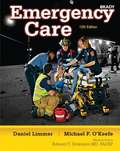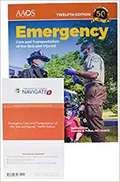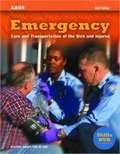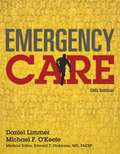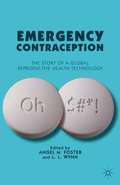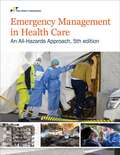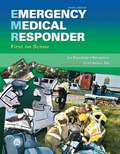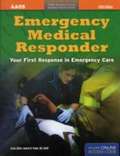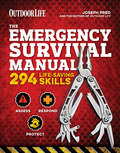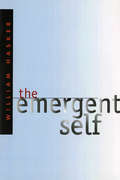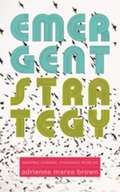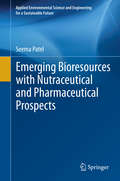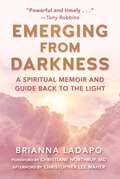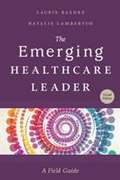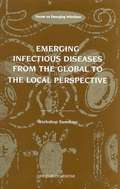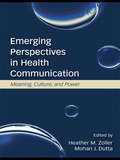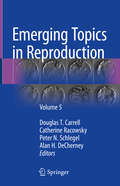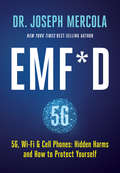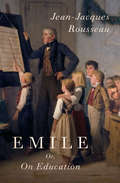- Table View
- List View
Emergency Care (12th Edition)
by J. David Bergeron Edward T. Dickinson Michael F. O'Keefe Harvey D. Grant Robert H. Murray Jr. Daniel LimmerEmergency Care, Twelfth Edition, has set the standard for EMT training for over 30 years. Updated with the latest research and developments in emergency medical services, this edition meets the 2010 American Heart Association guidelines for CPR and ECC, providing all the practical information students need to succeed in the classroom and in the field. Using the National EMS Education Standards as a foundation, this edition goes beyond the Standards to provide the most current, accurate reflection of EMS practice today. Getting students to think like an EMT, the text integrates scientific principles in a way that's easy to understand, and a host of critical thinking features-including a new chapter, "Critical Thinking and Decision Making,"-helps students learn key concepts while getting a dose of the reality of being an EMT.
Emergency Care And Transportation Of The Sick And Injured Essentials Package
by AaosAbout Emergency Care and Transportation of the Sick and Injured, Twelfth Edition: Since 1971, Emergency Care and Transportation of the Sick and Injured has advanced how EMS education is delivered to help train exceptional EMS professionals around the globe. Fifty years later, the Twelfth Edition is now the most advanced EMT teaching and learning system ever developed. Current State-of-the-Art Medical Content Comprehensive coverage of the National EMS Education Standards and the 2020 American Heart Association (AHA) Guidelines for Cardiopulmonary Resuscitation and Emergency Cardiovascular Care (ECC). Evidence-based medical concepts are incorporated to ensure that students and instructors have accurate, insightful interpretation of medical science as it applies to prehospital medicine today. Updated coverage of PPE and CDC guidelines for safe patient care during COVID-19 pandemic. A Focus on Career Readiness and Employability Greater emphasis on soft skill development, including empathy, teamwork, interpersonal skills, and problem solving, and how critical these skills are for better patient outcomes. Enhanced content on provider mental health, wellness, and safety. Evolving patient case studies that deliver clinical education and help prepare students to care for patients in the field. The cases offer increased focus on EMS provider leadership and critical thinking skills throughout the text. A new “Street Smarts” feature that helps bridge the gap between the classroom and field environment by addressing nontechnical skills that improve patient and co-worker interactions. A Foundation for Success The textbook design and layout have been revised to improve visualization of key content and overall readability. Comprehensive anatomy, physiology, pathophysiology, and medical terminology content is delivered in early chapters, and subsequently reinforced in related chapters throughout the textbook. Valuable student resources, including audiobook, interactive lectures, test prep, soft-skill simulations, and videos cater to a variety of learning styles and needs. Educators are supported by a broad range of instructional and assessment resources to fully enable traditional, hybrid, and flipped course delivery.
Emergency Care and Transportation of the Sick and Injured (10th Edition)
by Andrew N. Pollak Leaugeay Barnes Joseph A. Ciotola Benjamin GulliThis textbook serves as the primary resource for the emergency medical technician (EMT) course. It also discusses what will be expected of you during the course and what other requirements you will have to meet to be licensed or certified as an EMT in most states. You will also learn about the differences between first aid training, a Department of Transportation (DOT) emergency medical responder (EMR) training course, and the training courses for an EMT, advanced emergency medical technician (AEMT), and paramedic.
Emergency Care and Transportation of the Sick and Injured (9th edition)
by American Academy of Orthopaedic SurgeonsThis Ninth Edition is the center of an integrated teaching and learning system that will help define the future direction of Emergency Medical Services education. It combines comprehensive medical content with dynamic new features and interactive technology to better support instructors and to help prepare students for the field.
Emergency Care (Thirteenth Edition)
by Daniel Limmer Michael F. O'Keefe Harvey Grant Bob Murray J. David Bergeron Edward T. DickinsonFor courses in Emergency Medical Technician Training and Emergency Medical Services Help students think like EMTs with the gold standard for EMT training For over 30 years, Emergency Care has provided generations of EMT students with the practical information they need to succeed in the classroom and in the field. Updated with the latest research and developments in emergency medical services, this edition meets the 2010 American Heart Association guidelines for CPR and ECC. Using the National EMS Education Standards as a foundation, Emergency Care goes beyond the Standards to provide the most current, accurate reflection of EMS practice today. The text integrates scientific principles in an easy-to-understand way, with a host of critical-thinking features that help students learn to think like EMTs. Also available with MyBRADYLab(tm) This title is also available with MyBRADYLab-an online homework, tutorial, and assessment program designed to work with this text to engage students and improve results. Within its structured environment, students practice what they learn, test their understanding, and pursue a personalized study plan that helps them better absorb course material and understand difficult concepts. NOTE: You are purchasing a standalone product; MyBRADYLab does not come packaged with this content. If you would like to purchase both the physical text and MyBRADYLab, search for ISBN: 0134190750/9780134190754 Emergency Care plus MyBRADYLab with Pearson eText -- Access Card -- for Emergency Care That package includes: 0133946096 / 9780133946093 MyBRADYLab with Pearson eText -- Access Card -- for Emergency Care 0134024559 / 9780134024554 Emergency Care MyBRADYLab should only be purchased when required by an instructor.
Emergency Contraception
by Angel M. Foster L. L. WynnDespite its safety and efficacy, emergency contraception (EC) continues to spark political controversy worldwide. In this edited volume, authors explore how emergency contraception has been received, interpreted, and politicized, through the in-depth examination of the journey of EC in 16 individual countries.
Emergency Cross-sectional Radiology
by Dipanjali Mondal Erskine J. Holmes Rakesh Misra Daniel Y. ChungCross-sectional imaging plays an ever-increasing role in the management of the acutely ill patient. There is 24/7 demand for radiologists at all levels of training to interpret complex scans, and alongside this an increased expectation that the requesting physician should be able to recognise important cross-sectional anatomy and pathology in order to expedite patient management. Emergency Cross-sectional Radiology addresses both these expectations. Part I demystifies cross-sectional imaging techniques. Part II describes a wide range of emergency conditions in an easy-to-read bullet point format. High quality images reinforce the findings, making this an invaluable rapid reference in everyday clinical practice. Emergency Cross-sectional Radiology is a practical aide-memoire for emergency medicine physicians, surgeons, acute care physicians and radiologists in everyday reporting or emergency on-call environments.
Emergency Dermatology
by Lawrence Charles Parish Batya B. Davidovici Jennifer L. Parish Ronni WolfMany physicians and patients do not believe that dermatology involves life-threatening situations. However, there are many emergencies that the dermatologist needs to address and many cutaneous diseases in the emergency room that require rapid dermatologic consultation. The dermatologist is frequently the first physician to examine these patients before a hospital admission, and also the first to identify a critical situation, stabilize the patient, and choose urgent and appropriate intervention. The first chapters of this book are directed toward those dermatologists who care for hospitalized patients with severe and dangerous skin diseases. Later chapters are intended for all physicians, including dermatologists, who wish to hone their diagnostic skills, expand their knowledge and understanding of pathological events, and learn treatment options available for acute life-threatening skin diseases. This book brings together top dermatologists around the world to address the complicated and multifaceted field of dermatologic emergencies for the practising dermatologist and emergency physician.
The Emergency Diaries: Stories from Doctors Inside the ER
by Northwell's Staten Island University HospitalHarrowing and hopeful tales from doctors inside the emergency room at Staten Island University Hospital—one of the flagship hospitals of Northwell Health, New York&’s largest health care provider Open 24 hours a day, 365 days a year—through winter storms, hurricanes, and global pandemics—emergency rooms are vital to the safety of any community. Day in and day out, thousands of patients pass through their doors to address their immediate medical needs. From life-threatening illnesses to minor ailments, ER doctors and nurses are the first line of defense when something goes wrong with our bodies. Written as a series of essays and stories by real ER doctors, The Emergency Diaries gives readers a glimpse into the hearts and minds of medicine&’s finest, and the seemingly insurmountable challenges these everyday heroes face. Doctors recount firsthand the challenging nature of their profession and share pivotal moments in their medical careers that have stuck with them to this day. Whether it&’s delivering the bad news or making split-second decisions to save lives, the extremes of this profession can be overwhelming. ER doctors and nurses are under incredible pressure to act with grace, precision, and mental fortitude when caring for their patients. Larger national events—like the opioid epidemic, natural disasters, and the coronavirus pandemic—have only exacerbated this stress in recent years. This poignant-yet-hopeful book tells their stories and serves as a testament to their incredible resilience and sacrifice for the greater good.
Emergency Guide for Dental Auxiliaries (Third Edition)
by Janet B. ChernegaMedical emergencies can and do occur within the dental office environment. A large percentage of these emergencies could be prevented or at least better treated if all the members of the dental team were more knowledgeable in the prevention and management of emergency situations. Emergency Guide for Dental Auxiliaries, 3e is designed to provide dental auxiliaries with the basic skills and knowledge necessary in order for them to function effectively as part of the dental team when faced with a medical emergency. A must for all dental auxiliaries working in dental offices to stay up to date on possible medical emergencies, First Aid skills, and important information on the legal aspect of emergency care in the dental office. (key words: dental, dentist, dental auxiliaries, dental emergency, dental assisting)
Emergency Management In Health Care, An All-hazards Approach, 5th Edition
by Joint Commission ResourcesPublic health crises, such as COVID-19, natural disasters from wildfires to tornados, and human-caused emergencies, including mass shootings and cyberattacks, have been on the rise in recent years, putting health care organizations on high alert. Because of the unpredictability of emergencies, The Joint Commission champions an all-hazards approach to emergency management (EM), reflected in its requirements. Emergency Management in Health Care: All All-Hazards Approach, 5th edition, is a comprehensive, up-to-date resource to help all types of health care organizations plan for a wide range of emergencies. This new edition has been completely revised to reflect The Joint Commission’s new “Emergency Management” chapter for hospitals and critical access hospitals (effective July 1, 2022) and continues to address the EM planning needs of all health care settings.
Emergency Medical Responder: First on Scene (Ninth Edition)
by Chris Le Baudour J. David Bergeron Gloria Bizjak Keith WesleyThe leader in the field, Emergency Medical Responder, Ninth Edition, provides clear first responder-level training for fire service, emergency, law enforcement, military, civil, and industrial personnel. The new ninth edition retains many successful features from previous editions and includes new topics and concepts that have recently become part of most Emergency Medical Responder programs. The foundation of this text is the new National Emergency Medical Services Education Standards for Emergency Medical Responder, and it also includes the 2010 American Heart Association guidelines for Cardiopulmonary Resuscitation and First Aid.
Emergency Medical Responder: Your First Response in Emergency Care (5th Edition)
by David SchottkeUpdated to the new National EMS Education Standards and endorsed by the American Academy of Orthopaedic Surgeons, the fifth edition of our core first responder textbook, Emergency Medical Responder, continues to take an assessment-based approach to emergency medical responder training. Designed to meet the needs of law enforcement personnel, fire fighters, rescue squad personnel, athletic trainers, college students, and laypersons, The text and features found in the fifth edition will help students take the next step toward becoming outstanding Emergency Medical Responders.
Emergency Preparedness: Merit Badge Series
by Boy Scouts of AmericaA guide for completing the emergency preparedness merit badge for Boy Scouts.
The Emergency Survival Manual: 294 Life-Saving Skills (Outdoor Life)
by Joseph Pred The Editors of Outdoor LifeFrom break-ins to basement flooding to broken bones, this guide has everything you need to be prepared for any emergency that comes your way.Who’s better suited to write a book about handling emergencies than an Emergency and Risk Management Consultant and the CEO of Mutual Aid Response Services (MARS)? Joseph Pred is the go-to-guy for assessing and handling emergencies. When you combine his knowledge with that of the experts at Outdoor Life magazine, what do you get? An epic book filled with lifesaving skills. This book also covers what to do before the first responders arrive…or if they never do.Basic Tools & Skills: Everything you need to know to assess and start handling an emergency. From stocking a first aid kit and treating burns, cuts and broken bones, to protecting yourself when using pepper spray and performing CPR.Home and Family Safety: Protect your house and keep you and your family safe. Learn how to deal with a lost child, handle house fires, public transit scares, car accidents, and help a sick or hurt pet.Community Safety: All the ways to help your neighbors and keep your community safe. From what to do if you see a house being broken into and dealing with school tragedies, to coping with a major natural disaster and handling a toxic spill—and everything in between.When disaster strikes you want to be ready, and you can be with the Emergency Survival Manual.
The Emergent Self
by William HaskerIn The Emergent Self, William Hasker joins one of the most heated debates in analytic philosophy, that over the nature of mind. His provocative and clearly written book challenges physicalist views of human mental functioning and advances the concept of mind as an emergent individual. Hasker begins by mounting a compelling critique of the dominant paradigm in philosophy of mind, showing that contemporary forms of materialism are seriously deficient in confronting crucial aspects of experience. He further holds that popular attempts to explain the workings of mind in terms of mechanistic physics cannot succeed. He then criticizes the two versions of substance dualism most widely accepted today--Cartesian and Thomistic--and presents his own theory of emergent dualism. Unlike traditional substance dualisms, Hasker's theory recognizes the critical role of the brain and nervous system for mental processes. It also avoids the mechanistic reductionism characteristic of recent materialism. Hasker concludes by addressing the topic of survival following bodily death. After demonstrating the failure of materialist views to offer a plausible and coherent account of that possibility, he considers the implications of emergentism for notions of resurrection and the afterlife.
Emergent Strategy: Shaping Change, Changing Worlds
by Adrienne Maree BrownIn the tradition of Octavia Butler, here is radical self-help, society-help, and planet-help to shape the futures we want. Change is constant. The world, our bodies, and our minds are in a constant state of flux. They are a stream of ever-mutating, emergent patterns. Rather than steel ourselves against such change, Emergent Strategy teaches us to map and assess the swirling structures and to read them as they happen, all the better to shape that which ultimately shapes us, personally and politically. A resolutely materialist spirituality based equally on science and science fiction: a wild feminist and afro-futurist ride!adrienne maree brown, co-editor of Octavia’s Brood: Science Fiction from Social Justice Movements, is a social justice facilitator, healer, and doula living in Detroit.
Emerging Bioresources with Nutraceutical and Pharmaceutical Prospects
by Seema PatelThis book introduces some emerging functional foods that are natural resources with tremendous promise as nutraceuticals and pharmaceuticals. The author considers biodiversity and bioprospecting as a response to food security issues, drug-resistance, nutrition-poor diets and other problems, exploring the prospects of several under-utilized nutrients and bioactive repositories. Readers will discover biochemical makeups, validated health benefits, explanations of underlying mechanisms, hurdles in the path of popularity and promotion strategies. Chapters explore particular plants, seeds and fruits including the strawberry guava, opuntia fruits, the Carissa genus, grape seeds, quinoa and the milk thistle (Silybum), amongst others. They are considered as food sources where possible and from the perspective of the roles they can play in complementary and alternative medicine, such as in wound healing, antimicrobial activity, gastroprotective activity in treatment of cancers and as natural antioxidant sources. This rich compilation holds plausible solutions to a range of current issues and it endorses the much-needed goal of sustainability in terms of diet and drugs. It paves the path for further research and development on hitherto obscure natural resources. Scientists working in the area of food development, phytochemical and antioxidant analysis, bioprospecting of low-profile foods and in complementary and alternative medicine will find this work particularly valuable. It will also be of interest to the general reader with an interest in food science, food security, phytochemicals and functional food studies.
Emerging from Darkness: A Spiritual Memoir and Guide Back to the Light
by Brianna LadapoOne woman's extraordinary journey from a life of physical and emotional pain to health and wholeness This book is about the divine personal journey from the darkness into the light, and the collective journey we have undertaken as human beings, incarnated on earth at this spectacular moment of transformation, to move out of the separation consciousness that keeps us locked into patterns of conflict, suffering, and destructive behavior. The author takes us through her troubled, tumultuous childhood in a deeply religious family who believed her extraordinary intuitive gifts to be the work of the devil. As she struggled to adapt to a world in which she felt completely alien, her desire for self-preservation and acceptance led her to actively suppress these gifts. The result was a great deal of suffering, including chronic migraines that regularly put her in the hospital, severe physical illness that nearly killed her, persistent, dark visions of tragedies she could not prevent, and countless sexual traumas and abuses that seemed to define every relationship in her formative years. This led to a deep distrust and fear of others, incredible self-doubt and loathing, and ultimately, a very dark depression. Finally, an encounter with a divinely gifted healer reawakened her gifts and taught her how to truly free herself from her trauma and experience a life she loves, invulnerable to programming, fear, shame, or external influences. The author&’s experience serves both as loving encouragement for all those suffering under the current reality, and as a practical guide for reclaiming your sovereign soul, discovering your true purpose, and finding the courage to pursue it fearlessly.
The Emerging Healthcare Leader: A Field Guide
by Laurie K. Baedke Natalie D. LambertonIn the ever-changing healthcare environment, the profession of healthcare management needs strong leaders who will rise to the challenges of today and carry organizations into the future. The Emerging Healthcare Leader: A Field Guide is an essential resource for those in the early stages of becoming a healthcare leader. Packed with tactics, tips, and illuminating straightforward examples, this book is an indispensable guide to building your career in healthcare leadership. Honestly and authentically, authors Laurie Baedke and Natalie Lamberton offer practical suggestions and share anecdotes, personal stories, and important lessons learned from their own professional experiences. The book covers: - Developing self-awareness - Practicing self-management - Cultivating your personal brand - Launching your career - Understanding and refining your leadership style - Learning and rebounding from failures - Maximizing your internship opportunities - Mastering the interview process This second edition includes new chapters on emotional intelligence and successful onboarding. Valuable content on technology, social media, online presence, networking, and professional decorum has been updated and expanded. Four new "Notes to My 25-Year-Old Self" from distinguished healthcare leaders are sources of additional inspiration and insight for readers. Whether you're a newcomer to healthcare management or transitioning into a leadership role, The Emerging Healthcare Leader: A Field Guide provides the advice and ideas you need to advance your career.
Emerging Infectious Diseases from the Global to the Local Perspective: A Summary of a Workshop of the Forum on Emerging Infections
by Institute of MedicineIn October 1999, the Forum on Emerging Infections of the Institute of Medicine convened a two-day workshop titled “International Aspects of Emerging Infections.” Key representatives from the international community explored the forces that drive emerging infectious diseases to prominence. Representatives from the Americas, Africa, Asia and the Pacific, and Europe made formal presentations and engaged in panel discussions. Emerging Infectious Diseases from the Global to the Local Perspective includes summaries of the formal presentations and suggests an agenda for future action. The topics addressed cover a wide range of issues, including trends in the incidence of infectious diseases around the world, descriptions of the wide variety of factors that contribute to the emergence and reemergence of these diseases, efforts to coordinate surveillance activities and responses within and across borders, and the resource, research, and international needs that remain to be addressed.
Emerging Perspectives in Health Communication: Meaning, Culture, and Power (Leas Communication Ser.)
by Heather Zoller Mohan J. DuttaThis volume provides the theoretical, methodological, and praxis-driven issues in research on interpretive, critical, and cultural approaches to health communication. It includes an international collection of contributors, and highlights non-traditional (non-Western) perspectives on health communication.
Emerging Topics in Reproduction: Volume 5
by Douglas T. Carrell Catherine Racowsky Peter N. Schlegel Alan H. DeCherneyPreviously known as Biennial Review of Infertility, the fifth installment in this series brings together the most current research and clinical evidence on male and female infertility, emerging assisted reproductive technologies (ART) and evolving controversies in reproductive medicine. In this latest volume, parts one and two discuss recent developments in male and female infertility respectively, including fertility preservation in the male adolescent cancer patient, the clinical relevance of sperm RNA, the management of subclinical hypothyroidism, and the effects of endocrine-disrupting chemicals. Part three covers the latest in ART, such as evidence-based morphological approaches for embryo selection and culturing human embryos. The final section highlights controversies in reproductive medicine, including the use of preimplantation genetic screening (PGS) and blastocyst transfer, as well as the ethics surrounding a maximum BMI for IVF. Providing an ongoing appraisal of current knowledge, and featuring contributions from leading experts in the field, Emerging Topics in Reproduction, Volume 5 is a worthy addition to the series and an ideal resource on the latest topics for reproductive medicine and REI specialists, OB-GYNS, andrologists, and any clinician working with infertility.
EMF*D: 5G, Wi-Fi & Cell Phones: Hidden Harms and How to Protect Yourself
by Dr. Joseph MercolaThe dangers of electromagnetic fields are real--and now a renowned health authority reveals exactly what they are and how you can protect yourself.The hazards of electronic pollution may once have been the stuff of science fiction, but now we know they're all too real. And with the advent of 5G ultra-wideband technology, the danger is greater than ever.Dr. Joseph Mercola, one of the world's foremost authorities on alternative health, has mined the scientific literature to offer a radical new understanding of how electromagnetic fields impact your body and mind. In this first-of-its-kind guide, he reveals:What EMFs (electromagnetic fields) actually are, where you find them in your daily life, and how they affect youThe toll that EMFs have been proven to take in conditions such as cancer, heart disease, and neuropsychiatric illnessesWhy you've been largely kept in the dark about this threat to your healthHow you can actually repair the damage done by EMFs at a cellular levelPractical strategies to protect yourself and your loved ones from EMFs at home, at work, and out in the worldThe coming 5G technology will be pervasive and powerful. It will also be one of the largest public-health experiments in history-with no way of opting out. That's why you need to read this book. Now.
Emile: Or On Education
by Jean-Jacques Rousseau Barbara FoxleyThe once banned and burned treatise on the nature of education from the eighteenth-century philosopher and author of The Social Contract. Considered by Jean-Jacques Rousseau himself to be the &“best and most important&” of all his writings, Émile set off a firestorm when it was first published in 1762. It was banned in Paris and burned in Geneva, but later served as the inspiration for a new national system of education during the French Revolution. In its pages, Émile and his tutor embark on a scholarly journey through the boy&’s upbringing. The book also follows the character of Sophie, commenting on the role of women in society. &“More a tract upon education with the appearance of a story than it is a novel, the book describes the ideal education which prepares Émile and Sophie for their eventual marriage&” (The Roots of Educational Theory). &“Jean-Jacques Rousseau&’s Émile or Treatise on Education remains relevant today. The theories and beliefs of Enlightenment philosophers such as Rousseau played a big role in shaping the beliefs of the public at the time, particularly when they were able to distribute their ideas on paper. Without written documents such as this one, it would be impossible to understand their impact on society and, more broadly, on how the idea of nature-based gender and separated spheres have evolved to what they are today.&” —Towards Emancipation?
